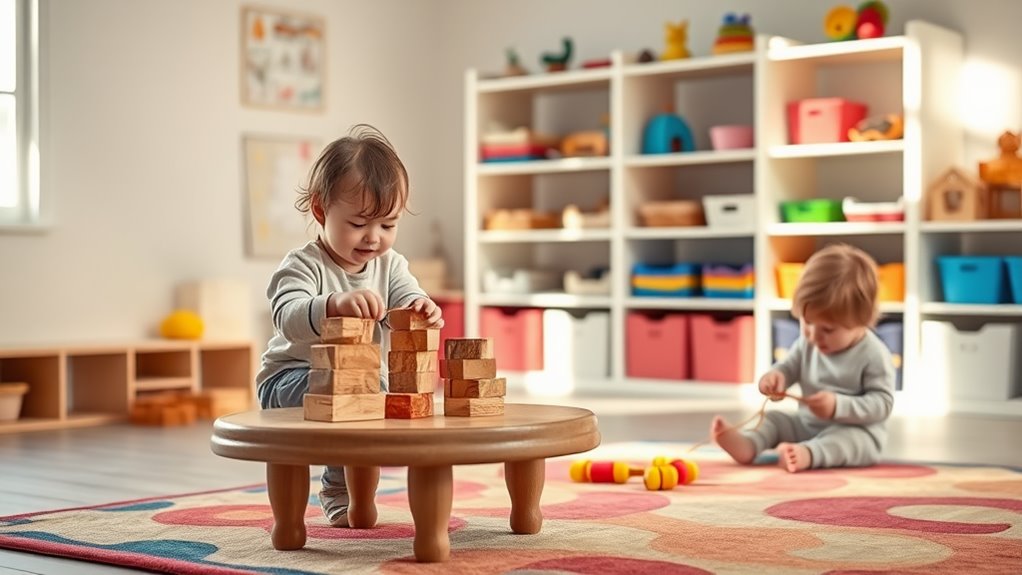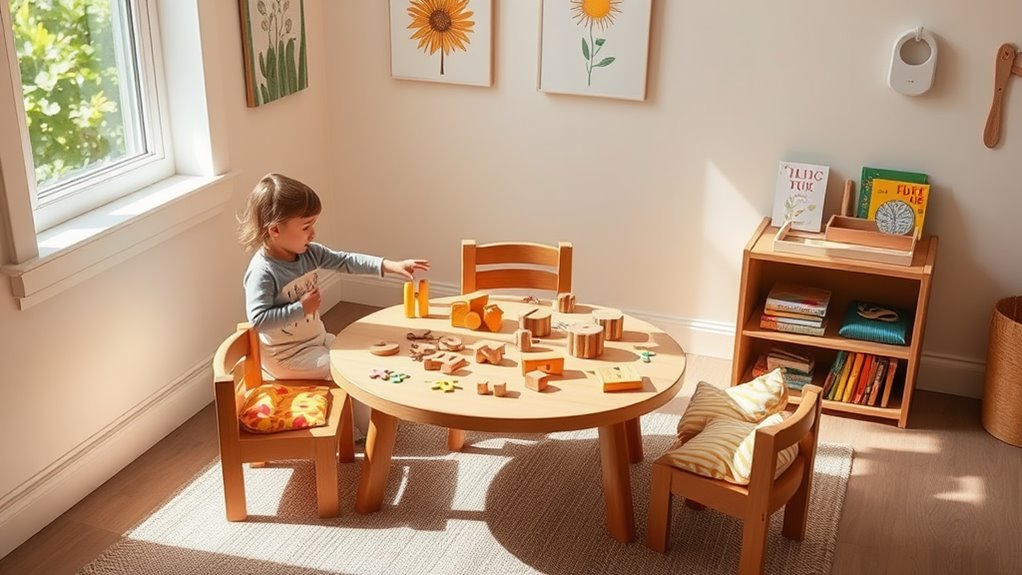The Role of Responsive Parenting in Attachment Theory
When you think about the dynamics of parent-child relationships, consider how responsive parenting shapes a child’s emotional landscape. By being attuned to a child’s needs, you not only foster secure attachments but also set the stage for their future interactions. This concept raises important questions about what happens when that responsiveness is lacking. How do these early experiences influence a child’s development and their capacity for trust? Exploring these intricacies reveals much more than just parenting strategies; it uncovers the foundations of emotional well-being.
Understanding Attachment Theory
Attachment theory lays the groundwork for understanding how early relationships shape emotional and social development. It suggests that the bonds you form with your caregivers during childhood affect how you relate to others throughout your life.
When you’re nurtured and supported, you’re more likely to develop a secure attachment. This means you feel safe, confident, and able to explore the world around you.
On the flip side, if your early experiences are inconsistent or neglectful, you might develop an insecure attachment style. This can lead to challenges in trusting others or managing emotions as you grow up. Think of attachment as the foundation of a house; if it’s solid, the structure remains stable. If it’s weak or shaky, the whole building can be at risk.
Understanding this theory helps you realize the importance of those early connections. It’s not just about hugs and kisses; it’s about how these interactions influence your behavior and relationships later on.
Importance of Secure Attachments
Building on the understanding of how early connections shape your emotional landscape, secure attachments play a vital role in fostering a stable and healthy development. When you form these attachments, you create a strong foundation for trust and safety. This sense of security allows you to explore the world with confidence, knowing that you can return to a safe base when needed.
Secure attachments not only enhance emotional well-being but also influence social skills. When you feel secure, you’re more likely to form positive relationships with others, which can lead to strong friendships and supportive networks. This, in turn, promotes empathy and understanding, helping you navigate social situations more effectively.
Moreover, secure attachments can positively impact academic performance. When you have a stable emotional base, you’re better equipped to focus on learning and tackling challenges. You’ll likely feel less anxious and more motivated to engage in new experiences.
In essence, secure attachments lay the groundwork for resilience, helping you cope with life’s ups and downs. By nurturing these connections early on, you can pave the way for a fulfilling life filled with strong relationships and personal growth.
Definition of Responsive Parenting
Responsive parenting is a nurturing approach that emphasizes being attuned to your child’s needs and emotions. It involves actively listening to your child, observing their behavior, and responding appropriately. When you practice responsive parenting, you create a supportive environment where your child feels safe and understood. This connection helps them develop trust and confidence in you as their caregiver.
In responsive parenting, you recognize that every child is unique. You learn to interpret their cues, whether they’re verbal or non-verbal, and respond in ways that help them feel validated. For instance, when your child is upset, you might comfort them with a hug or offer words of encouragement. By doing this, you show them that their feelings matter, fostering emotional security.
Additionally, responsive parenting encourages open communication. You engage your child in conversations, asking questions and offering your insights. This not only strengthens your bond but also promotes your child’s social and emotional development.
Key Principles of Responsive Parenting
Several key principles underpin responsive parenting, and understanding them can greatly enhance your relationship with your child.
First, being attuned to your child’s needs is vital. This means paying attention to their cues, whether they’re hungry, tired, or just need a hug. When you respond promptly, it builds trust and security.
Next, consistency is important. Children thrive on routines, and knowing what to expect helps them feel safe. By establishing predictable patterns, like bedtime rituals, you create a comforting environment that fosters attachment.
Another principle is emotional availability. It’s important to be present both physically and emotionally. When you engage with your child, whether through play or conversation, you nurture their emotional development.
Lastly, practice positive reinforcement. Celebrating your child’s achievements, no matter how small, boosts their self-esteem and encourages them to explore.
The Impact of Unresponsive Parenting
Unresponsive parenting can have lasting effects on a child’s emotional and social development. When caregivers consistently fail to respond to a child’s needs, it can create feelings of insecurity and anxiety. You might notice that children raised in such environments often struggle to form healthy relationships later in life. They may feel unsure about how to express their emotions or trust others, leading to difficulties in friendships and even romantic partnerships.
Moreover, unresponsive parenting can hinder a child’s ability to cope with stress. Since they’re not receiving the guidance and support they need, they might develop maladaptive coping strategies, like avoidance or aggression. These patterns can follow them into adulthood, making life’s challenges even harder to navigate.
It’s also worth noting that unresponsive parenting can affect a child’s self-esteem. When a child feels ignored or undervalued, they may internalize these feelings, believing they’re unworthy of love or attention. This can lead to a cycle of negative self-perception that persists over time.
In short, unresponsive parenting doesn’t just impact childhood; it can shape a person’s entire life, influencing their emotional well-being and relationships for years to come.
Emotional Availability and Sensitivity
Emotional availability and sensitivity are essential components of effective parenting, as they directly influence a child’s ability to form secure attachments. When you’re emotionally available, you’re tuned into your child’s feelings and needs. This connection helps them feel understood and valued, which is vital for their emotional development.
Sensitivity means responding appropriately to their cues, whether they’re expressing joy, sadness, or frustration. Think about how a baby cries for comfort. If you respond quickly and warmly, you’re teaching them that they can trust you to be there when they need support. This trust is the foundation of secure attachment.
On the other hand, if you seem distant or unresponsive, your child may struggle to feel safe and secure, leading to anxiety and insecurity. Being emotionally available doesn’t mean you have to be perfect; it’s about being present and engaged.
By showing empathy and understanding, you create a nurturing environment that fosters healthy emotional growth. Remember, your reactions shape how your child learns to express their feelings and interact with others.
Strategies for Responsive Parenting
Building on the importance of emotional availability and sensitivity, there are various strategies you can adopt to practice responsive parenting. First, always pay attention to your child’s cues. When they cry or show signs of distress, respond quickly and calmly. This helps them feel understood and secure.
Next, create a routine that includes time for play and connection. Engaging in activities your child enjoys can strengthen your bond and provide opportunities for emotional sharing.
You can also practice active listening. When your child talks, make eye contact, nod, and show that you’re interested in what they’re saying. This encourages them to express their feelings and thoughts openly.
Additionally, validate their emotions. If they’re upset, acknowledge their feelings by saying, “I see you’re feeling sad. It’s okay to feel that way.” This helps them learn that their emotions are valid and worthy of attention.
Lastly, be mindful of your own emotional state. Children often mirror their caregivers’ emotions. By managing your feelings and reactions, you create a stable environment that promotes healthy attachment.
These strategies can greatly enhance your responsiveness, leading to a stronger, more trusting relationship with your child.
Encouraging Open Communication
While fostering a strong attachment with your child, encouraging open communication is essential for building trust and understanding. When your child feels safe to express their thoughts and feelings, they’re more likely to develop a secure bond with you.
Start by creating an environment where they know their opinions matter. Show genuine interest in what they’ve to say, and listen actively. This means giving them your full attention, making eye contact, and responding thoughtfully to their words.
It’s important to ask open-ended questions, too. Instead of just yes or no questions, try asking, “What was the best part of your day?” This invites deeper conversations and gives them a chance to share experiences and feelings.
Don’t shy away from discussing emotions, whether they’re happy, sad, or frustrated. Encourage your child to express themselves freely, without fear of judgment.
Moreover, share your own thoughts and feelings. This models healthy communication and helps your child see that it’s okay to be open.
Recognizing and Responding to Cues
Recognizing and responding to your child’s cues is a vital aspect of responsive parenting. When you pay attention to how your child communicates, whether through cries, gestures, or facial expressions, you’re building a strong foundation for their emotional development. Each cue they give is like a little message, telling you what they need—comfort, food, or maybe just a little playtime.
It’s important to observe these signals closely. For instance, if your child is fussing and arching their back, they might be uncomfortable or tired. Responding promptly to these needs helps your child feel safe and understood. This isn’t just about meeting immediate needs; it’s about fostering a secure attachment. When you consistently respond to their cues, your child learns that they can trust you to support them.
Take time to reflect on your interactions. Are you recognizing when they’re excited versus when they’re upset? Each moment you engage with them strengthens your bond. By tuning in and responding thoughtfully, you’re not only meeting their needs but also nurturing a sense of security that will benefit them throughout their life.
Fostering Independence Through Support
Through a delicate balance of support and encouragement, you can foster your child’s independence while still being their safe haven. When you allow your child to explore new activities and make choices, you’re giving them the chance to develop confidence.
Start by creating a safe environment where it’s okay to try new things. Whether it’s letting them pick their outfit or helping them with a new hobby, your involvement shows you care.
As your child takes steps toward independence, celebrate their successes, no matter how small. This positive reinforcement helps them feel supported, making them more willing to take risks.
It’s also important to step back occasionally and let them handle challenges on their own. If they struggle, offer guidance rather than solutions. This approach teaches problem-solving skills and resilience.
The Role of Consistency and Stability
Establishing consistency and stability in your parenting approach lays the groundwork for a secure attachment with your child. When you respond to your child’s needs predictably, they learn to trust you. This trust is vital for forming a strong bond.
Children thrive in environments where they know what to expect, so maintaining routines can help. For instance, regular meal times or bedtime rituals create a sense of safety.
Moreover, being consistent in your reactions to their behavior helps your child understand the boundaries you set. If you’re responsive one day but distant the next, it can confuse them and make them unsure of your availability.
Stability in your emotional responses is just as important. When you handle stress calmly and consistently, your child learns how to manage their own emotions.
Additionally, fostering an environment where your child feels secure encourages them to explore their surroundings. They’ll feel more confident taking risks, knowing you’re a reliable source of support.
Long-Term Benefits of Responsive Parenting
The consistency and stability you’ve built in your parenting approach set the stage for long-term benefits that extend well beyond early childhood. When you respond to your child’s needs with warmth and care, you foster a sense of security that lays the groundwork for their emotional health.
This strong foundation helps them develop resilience, allowing them to navigate life’s challenges more confidently. As your child grows, they’ll likely carry the lessons learned from your responsive parenting into their relationships with others.
They may find it easier to form friendships and maintain healthy connections because they understand the importance of empathy and communication. In addition, children who experience responsive parenting often exhibit better self-regulation skills, leading to improved academic performance and success in school settings.
In the long run, your efforts not only enhance your child’s immediate well-being but also equip them with essential life skills. They’ll be more equipped to handle stress, resolve conflicts, and face uncertainties with a positive mindset.
Ultimately, the long-term benefits of responsive parenting ripple through various aspects of their lives, setting them up for a happier, more fulfilling future.
Building Secure Attachments in Adolescence
During adolescence, nurturing secure attachments becomes essential as your child navigates a complex social landscape. This period is filled with changes, challenges, and new relationships, making it critical for you to remain a stable figure in their life. Your consistent support and understanding can help them feel safe and valued, encouraging them to explore their independence while knowing they can turn to you for guidance.
To build secure attachments, listen actively to your teen’s thoughts and feelings. Show empathy and validate their experiences, even if you don’t always agree. Engage in open conversations, allowing them to express themselves without fear of judgment. Encourage their interests and acknowledge their achievements, big or small.
It’s also important to set healthy boundaries. By establishing rules and expectations, you provide a sense of security that helps them feel grounded. Remember, your responsiveness plays an important role in reinforcing their self-esteem and trust in relationships.
As you foster these connections, you’re not just helping them build secure attachments; you’re equipping them with the emotional tools they need to thrive in adulthood. Your support today will resonate well into their future, shaping how they connect with others.




